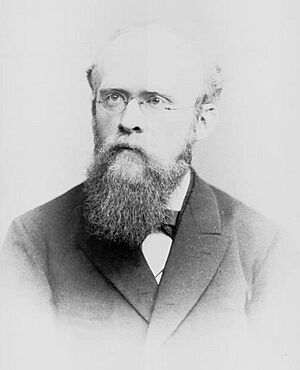Paul Klengel facts for kids
Paul Klengel was a talented German musician born in Leipzig on May 13, 1854. He was a master of many instruments, including the violin, viola, and piano. He was also a conductor, a composer who wrote his own music, and someone who helped arrange music for others. Paul was the brother of another famous musician, the cellist Julius Klengel. He passed away in Leipzig on April 24, 1935.
Contents
Paul Klengel's Musical Journey
Paul Klengel studied music at the Leipzig Conservatory of Music and also attended the University of Leipzig. In 1886, he earned a special degree for his ideas on "The Aesthetic of Music."
From 1881 to 1886, he led the choir for the Euterpe Music Society in Leipzig. Later, from 1888 to 1891, he worked at the Hofkapelle Stuttgart, which was a royal orchestra. He even traveled to New York City to conduct German choral groups from 1898 to 1902.
After his time in New York, Klengel returned to Leipzig. He became the conductor for the Arion Society and later joined the Leipzig Conservatory as a professor. There, he taught students how to play both the violin and the piano.
Paul Klengel was a very versatile musician, meaning he could do many things well. He was an excellent violinist and pianist who wanted to perform concerts as a soloist. He wrote many pieces for violin, viola, and piano. He also composed many songs and works for choirs. Klengel was well-known for creating beautiful arrangements of music for violin and viola, and many of these are still used today to teach young musicians.
Music Paul Klengel Composed
Paul Klengel wrote many different kinds of music. Here are some of the types of pieces he created:
Chamber Music
Chamber music is written for a small group of instruments, often played in a smaller room rather than a large concert hall. Klengel wrote many pieces for violins, violas, and pianos.
- Fünf Stücke (5 Pieces) for 2 violins, Op. 9 (published 1888)
- Fünf Characterstücke (5 Character Pieces) for violin and piano, Op. 11 (1894)
- Pastorale for violin and organ (or piano), Op. 17 (1901)
- Zwei Stücke (2 Pieces) for violin and piano, Op. 19 (1901)
- Fünf lyrische Tonstücke (5 Lyric Tone Pieces) for violin and piano, Op. 34 (1904)
- Suite No. 1 in D minor for violin and piano, Op. 38 (1909)
- Sechs Stücke (6 Pieces) for viola and piano, Op.39 (1910)
- Sechs lyrische Stücke (6 Lyric Pieces) for violin and piano, Op. 42 (1910)
- Zwei Charakterstücke (2 Character Pieces) for violin and piano, Op. 44 (1909)
- Serenade in D minor for violin and viola, Op.45 (1911)
- Drei Romanzen (3 Romances) for viola and piano, Op.46 (1912)
- Vier Phantasiestücke (4 Fantasy Pieces) for viola and piano, Op.48 (1912)
- Schumanniana for violin, viola and piano (1919); based on themes by Robert Schumann
- Vierzehn Präludien (14 Preludes) for violin solo, Op. 62 (1932)
Piano Music
Klengel also wrote many pieces specifically for the piano.
- Sechs Phantasiestücke (6 Fantasy Pieces), Op. 5 (1879)
- Drei Mazurkas (3 Mazurkas), Op. 7 (1879)
- Zwei Romanzen (2 Romances), Op. 8 (published 1891)
- Sechs Clavierstücke (6 Piano Pieces), Op. 10 (1886 or 1887)
- Acht Fantasiestücke (8 Fantasy Pieces), Op. 12 (1893)
- Fünf Stücke (5 Pieces), Op. 23 (1901)
- Vier Stücke (4 Pieces), Op. 37 (1909)
- Sechs Fantasiestücke (6 Fantasy Pieces), Op. 47 (1914)
- Fünf Fantasiestücke (5 Fantasy Pieces), Op. 49 (1917)
- Fünf Klavierstücke (5 Piano Pieces), Op. 54 (1922)
Vocal Music
He composed songs for singers, sometimes with piano accompaniment and sometimes with other instruments.
- Sechs zweistimmige Lieder (6 Two-Voice Songs) for 2 voices and piano, Op. 3 (1885)
- Trauungslied (Wedding Song) for voice and piano, Op. 6 (published 1900)
- Drei Lieder (3 Songs) for alto voice and piano, Op. 13 (1894)
- Fünf Lieder (5 Songs) for mezzo-soprano or alto voice and piano, Op. 14 (1894)
- Vier Lieder (4 Songs) for voice and piano, Op. 15 (1900)
- Drei duette (3 Duets) for mezzo-soprano, baritone and piano (1903)
- Fünf elegische Gesänge (5 Elegiac Songs) for mezzo-soprano or alto voice and piano, Op. 53 (1918)
- Vier Lieder (4 Songs) for medium voice with violin and piano, Op. 59 (1924)
Choral Music
Klengel also wrote music for choirs to sing.
- Die deutsche Mutter for alto voice, female chorus and piano, Op. 50 (1918)
- Lagarde (11. August 1914) for male chorus without instruments, Op. 51 (1918)
 | DeHart Hubbard |
 | Wilma Rudolph |
 | Jesse Owens |
 | Jackie Joyner-Kersee |
 | Major Taylor |


